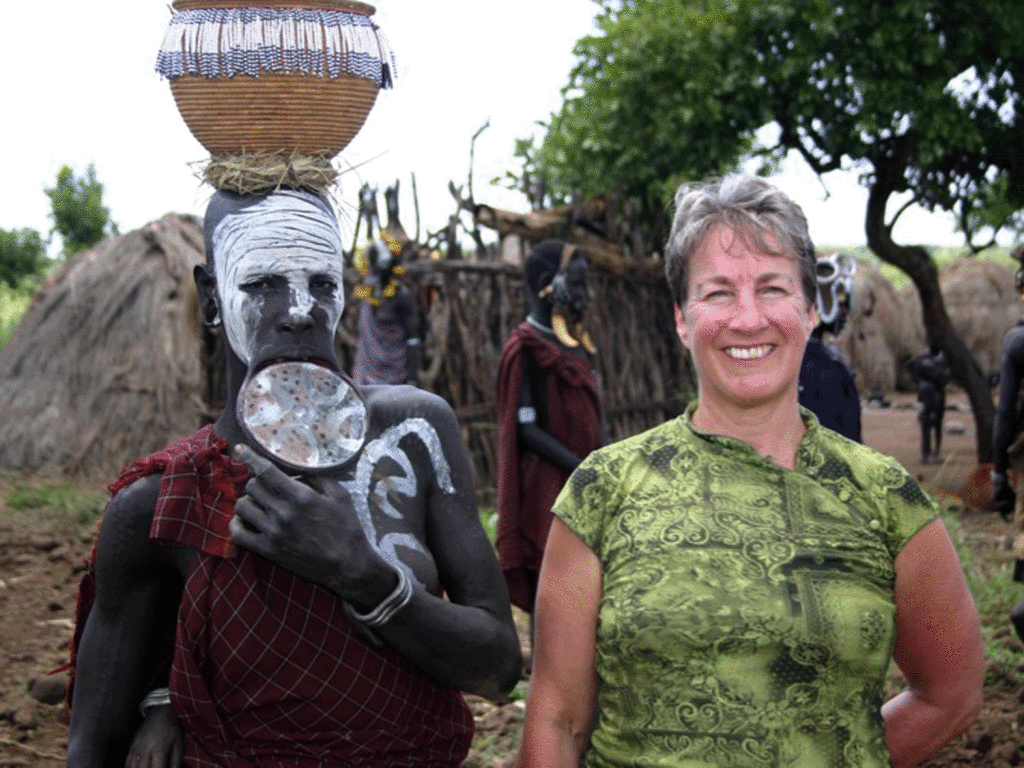Students filled room 115 of the Kirsch Center to near capacity as the presentation about the trip to Rwanda and Ethiopia by Kristin Jensen Sullivan and Mark Sullivan began.
It was the fourth trip to east Africa by the Sullivan’s, environmental studies instructors at De Anza College. The presentation highlighted biodiversity as well as the wide array of cultures within the two countries.
The Sullivan’s originally ventured to Rwanda to observe the mountain gorillas in Rwanda’s National parks near the Rift Valley, but said they were surprised to discover that most of Rwanda’s agrarian based population have never set foot in their own national parks.
“I’d say 99 percent [of Rwandans] have never been to the national parks,” explained Sullivan. “We’re working to change that.”
After their first visit to Rwanda nearly eight years ago, Mark Sullivan said he and his wife “fell in love with the place, people, and landscape” and wondered what they could do to give back to the locals who had shown them kindness.
The Sullivans revealed their plan to help preserve both biodiversity and culture in East Africa through their nonprofit organization, the Rwanda Environmental Awareness Project. Jensen Sullivan explained the goal of REAP is to provide Rwanda children with experience visiting and protecting their national parks.
Jensen Sullivan said she feels that everyone is entitled to enjoy the natural beauties on the planet.
“Everyone deserves beauty, clean air, clean water, biodiversity and access to preserved land, it’s part of our natural heritage,” she said.
Mark Sullivan said 75 percent of the drinking water in Rwanda originates from the national forests.
“One-third of people worldwide don’t have access to daily fresh water,” Jensen Sullivan said.
She continued to explain why children need to be exposed to their parks: “It is environmentally important to people of Rwanda because it is their source for drinking water and they don’t necessarily know that this is the case,” she said.
The Sullivan’s explained national parks are often not visited the Rwandan people and most of the brochures in visitor centers are offered only in English and not in Kinyarwanda, Rwanda’s native language.
Furthermore, Jensen Sullivan said the national parks varied from savannahs to montane rainforests. The abundance of foliage and animals ranging from gorillas to numerous types of birds is another reason why the parks must be “preserved and protected.”
Jensen Sullivan attributed the biodiversity of Ethiopia to the elevation changes created by the Rift Valley, which allowed them to visit a, “variety of cultural groups and tribes.”
Computer science student, Janice Kim, 19, said that after the presentation, “I want to know more.
Jun Ag, a 25-year-old business major, seconded Kim’s feelings, saying he attended because he was “interested to learn about Rwanda.” “I got a lot more information than I expected,” he said.
In closing the presentation, the Sullivan’s urged students to visit east Africa and to discover their histories. “Find your sense of place. It’s really fascinating to get to know your history,” said Mark and Kristin Sullivan.
Mark Sullivan said 75 percent of the drinking water in Rwanda originates from the national forests.
“One-third of people worldwide don’t have access to daily fresh water,” he said.
Children need to be exposed to their parks, “It is environmentally important to people of Rwanda because it is their source for drinking water and they don’t necessarily know that this is the case.”
The Sullivans explained national parks are often not visited by the Rwandan people and most of the brochures in visitor centers are offered only in English and not in Kinyarwanda, Rwanda’s native language.
Jensen Sullivan said the national parks vary from savannahs to montain rainforests. The abundance of foliage and animals ranging from gorillas to numerous types of birds is another reason why the parks must be “preserved and protected.”
Jensen Sullivan attributed the biodiversity of Ethiopia to the elevation changes created by the Rift Valley, which allowed them to visit a “variety of cultural groups and tribes.”
Computer science student Janice Kim, 19, said that after the presentation, “I want to know more.”
In closing the presentation, the Sullivan’s urged students to visit East Africa and to discover their histories. “Find your sense of place,” Jenson Sullivan said. “It’s really fascinating to get to know your history.”

FUN – Environmental studies instructor Kristin Jensen Sullivan (bottom tier, second from right) poses with members of her “family” near the Rwandan capital of Kigali. In the picture are Tincent and Madarena and their children, Irankunda and Mahoro (right and left respectively on second to last upper tier) which means “love” and “peace” and Boy, located on top of the pyramid. (COURTESY OF KRISTEN JENSEN SULLIVAN)

PAINT – The Karo tribe, is known for face paint. They live along the Omo river in the southern region of Ethiopia. (COURTESY OF KRISTEN JENSEN SULLIVAN)

LANDSCAPE – The Rusizi district is located in southwestern Rwanda. (COURTESY OF KRISTEN JENSEN SULLIVAN)









